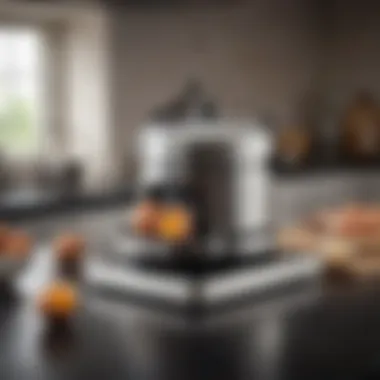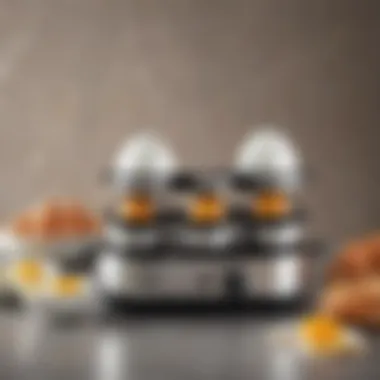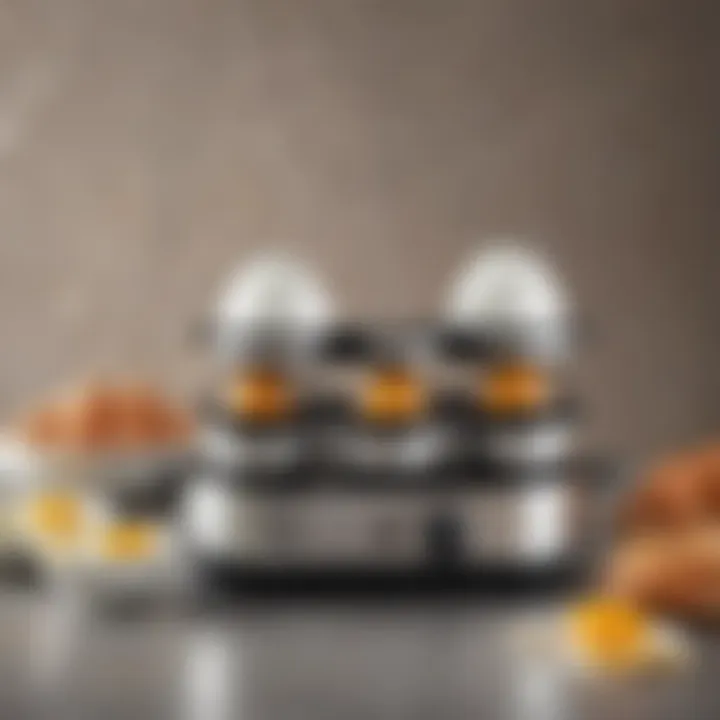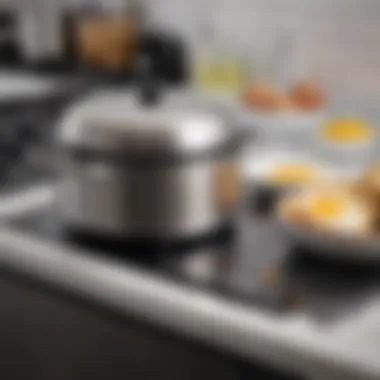The Importance of Stainless Egg Cookers in Modern Kitchens


Intro
In today’s fast-paced culinary landscape, efficiency and precision in cooking have become paramount. Stainless egg cookers have emerged as a game-changer, enabling home cooks and professional chefs alike to achieve perfect results effortlessly. This article aims to illuminate the various dimensions of stainless egg cookers, from their functionality and benefits to the factors influencing their choice and use.
These devices embody the marriage of technology and tradition, allowing for a seamless cooking experience. Much more than just a gadget, they represent an evolution in the way we approach egg preparation— a staple in diets worldwide.
The path to utilizing a stainless egg cooker goes beyond mere convenience; it serves as a bridge between innovative culinary practices and our time-honored traditions surrounding egg dishes. Let’s dive deeper into what makes these cookers indispensable in modern kitchens.
Prelims to Stainless Egg Cookers
Stainless egg cookers are essential tools in modern kitchens, making the process of egg preparation seamless and efficient. They've become quite popular for their ability to deliver perfectly cooked eggs with minimal effort. This section will delve into various facets of stainless egg cookers, highlighting their importance, distinctive features, and the numerous benefits they provide to culinary enthusiasts and home cooks alike.
Historical Context of Egg Cooking
Eggs have been a staple in human diets for thousands of years, prized for their nutritional value and versatility. The methods of cooking eggs have evolved significantly since their earliest days. Initially, eggs were boiled or fried over an open flame, leading to uneven cooking and inconsistent results. The convenience of cooking eggs remained a challenge until various tools and methods were developed.
- Ancient Techniques: In ancient societies, people used simple methods such as boiling in clay pots or frying on stones. These methods were all about availability and simplicity.
- Medieval Innovations: As time marched on, culinary practices saw greater refinement, particularly during medieval times when cast iron skillets became all the rage. There was a shift toward more controlled cooking methods and techniques.
- Modern Advances: Fast forward to the 20th century, innovations in kitchen appliances revolutionized how we cook eggs—bringing us to the advent of electric egg cookers. This technology has allowed people to achieve consistent results without the fuss of traditional methods.
Evolution of Egg Cookers
The evolution of egg cookers is a fascinating journey that mirrors advancements in kitchen technology. The simplest egg cookers were basic pots or skillets that were often stovetop-based. Over the years, chefs and home cooks alike began to crave convenience and precision, leading to various models of egg cookers that we now know today.
- The Early Days: The first known egg cookers were stovetop devices made from a variety of materials, including aluminum and cast iron. These cookers were simple yet very effective, but they lacked the precision that many cooks desired, often resulting in overcooked or undercooked eggs.
- Introduction of Electric Cookers: With the rise of electric appliances in the mid-20th century, egg cookers evolved into electrically powered devices. These modern cookers often feature timers, automatic shut-off mechanisms, and even settings for soft, medium, or hard-boiled eggs, greatly enhancing the cooking process.
- The Stainless Twist: Today, stainless steel has become the material of choice for many egg cookers, thanks to its durability, resistance to rust, and ease of cleaning. This shift not only enhances the aesthetic appeal of kitchen wares but also indicates a greater inclination towards longevity and sustainability in cookware choices.
"Stainless steel not only makes for a good looking appliance but also ensures that it can withstand the daily grind of cooking without losing its charm."
By understanding the history and evolution of egg cookers, it's clear how far we've come. From primitive techniques to sophisticated appliances, these tools reflect our advancing culinary practices and the desire for efficiency in cooking.
Understanding Stainless Steel as a Material
Stainless steel has secured a pivotal place in modern cookware, especially when it comes to egg cookers. This material is not just a trend; it's a fundamental choice that combines durability with functionality. Understanding the characteristics and advantages of stainless steel allows users to appreciate why it's favored in culinary applications today.
Properties of Stainless Steel
When folks think of stainless steel, they picture shiny surfaces and resilience, but there is more to it. Stainless steel is primarily an alloy made of iron with a sizeable percentage of chromium, which provides its rust-resistant properties. Here are a few key properties:
- Corrosion Resistance: The chromium in stainless steel forms a protective layer that keeps it from rusting or corroding, ensuring that stainless egg cookers maintain their aesthetic appeal and structural integrity over time.
- Non-reactive Surface: Unlike some other metals, stainless steel doesn’t react with acidic or alkaline foods. This is particularly beneficial for cooking eggs, as it allows for clean flavors without interference from metals leaching into the food.
- Durability: Stainless steel can take quite a beating without warping or scratching easily. This strength makes it an ideal choice for a kitchen appliance that faces constant heat and use.
- Heat Conductivity: While not the best compared to copper or aluminum, good-quality stainless steel does distribute heat evenly, which is essential for uniform cooking of eggs, whether soft-boiled or hard-boiled.
These properties combine to make stainless steel not just practical but also a long-lasting investment in any kitchen.
Benefits of Using Stainless Steel in Cookware
Choosing stainless steel for cookware comes with a heap of advantages that are hard to overlook. It’s not merely about the aesthetics; it’s about the overall cooking experience. Here are some benefits that make stainless steel a go-to option:
- Easy Maintenance: Cleaning stainless steel is a breeze. Unlike cast iron or some non-stick surfaces, food doesn’t stick stubbornly, simplifying cleanup, especially after making a batch of eggs.
- Versatile Cooking: Stainless steel cookers are compatible with all cooking sources like induction, gas, or electric, making them a versatile inclusion in any kitchen. Whether simmering or using steam, you can rely on these cookers across various platforms.
- Long-Lasting: The longevity of stainless steel means value for money. Users can expect minimal wear and tear, and if taken care of, these cookers can last a lifetime.
- Non-Toxic: Stainless steel does not contain any harmful chemicals often found in non-stick coatings. Health-conscious cooks can use stainless egg cookers without the worry of ingesting toxic substances.
Right from the richness in flavor to the safety in preparation, stainless steel stands as a clear winner in egg cooking technology.
"An informed choice in material can significantly elevate both the safety and quality of culinary experiences.”
This understanding of stainless steel’s properties and benefits solidifies its status as the material of choice, ensuring that stainless egg cookers not only perform effectively but also contribute positively to the everyday cooking routines of enthusiasts and professionals alike.
Mechanics of Stainless Egg Cookers
Understanding the mechanics of stainless egg cookers is crucial for anyone aiming to utilize them effectively in their culinary routines. These devices aren’t just an upscale gadget but are rooted in the principles of cooking that can elevate your egg game to new heights. Their design and functionality play a pivotal role in ensuring that eggs are cooked to perfection, every single time.
Stainless egg cookers help streamline the process of egg preparation, simplifying what can often be a tedious task in the kitchen. They bring precision and convenience, serving as a bridge between traditional cooking methods and modern culinary techniques. As we delve deeper, it's essential to grasp not just how they work, but also the innovative cooking methods they support.
How Stainless Egg Cookers Function
Stainless egg cookers operate on an almost alchemical process that translates into perfectly boiled, poached, or steamed eggs. At their core, these appliances utilize steam to cook eggs uniformly. Not only does this approach allow for even heat distribution, but it also minimizes the potential for overcooking.
- Heating Element: The fundamental component of these devices is a heating element which converts water into steam. This steam surrounds the eggs, ensuring they cook evenly.
- Steam Control: Many models come equipped with steam control features that let you set cooking times based on your desired doneness. Whether you prefer soft-boiled with a runny yolk or firm hard-boiled, this capability is crucial.
- Capacity Choices: Cooking multiple eggs at once is a breeze, with various models supporting anywhere from a couple to over a dozen eggs in one go, making them great for meal prep or family gatherings.
With a press of a button, a stainless egg cooker transforms the raw ingredients into a culinary delight, showcasing how simple mechanics can yield impressive results without requiring advanced cooking skills.
Different Cooking Methods Supported


Modern stainless egg cookers don’t just boil eggs; they open the door to an array of cooking methods, allowing culinary enthusiasts to experiment beyond the boiling tradition. Here are some methods supported by these versatile devices:
- Boiling: The classic method remains prominent, but with much more convenience. You can achieve varying levels of doneness, all thanks to the precise timing features.
- Poaching: Some stainless egg cookers help you poach eggs effortlessly. With built-in racks and delicately adjusted steam, this method results in tender, perfectly shaped poached eggs, great for breakfast or salads.
- Steaming: Beyond egg-centric dishes, users can employ steaming functions for vegetables. This not only nourishes but enhances flavors without losing critical nutrients that boiling may strip away.
"Today’s stainless egg cookers demonstrate that breakfast staples like eggs can be diced, scrambled, and cooked through methods that honor both tradition and modernity."
These options allow users to incorporate eggs into meals more creatively, presenting opportunities to enhance dishes from brunch favorites to elegant dinner options, illustrating the adaptability and practicality of these cookers in contemporary kitchens.
Nutritional Aspects of Eggs
Eggs have long been regarded as a cornerstone of a balanced diet due to their rich nutrient profile. Their nutritional aspects are not only vital for individual health but also illustrate the importance of precision in cooking, especially when utilizing stainless egg cookers. These devices are designed not just for convenience but also to retain the inherent nutrition present in eggs, ensuring that you get the most out of every dish.
Understanding Egg Nutrition
Eggs are packed with high-quality protein, essential vitamins, and minerals. Each egg contains about 6 grams of protein, which is important for muscle repair and overall health. They also deliver critical nutrients such as:
- Vitamin B12: Vital for nerve function and the production of red blood cells.
- Riboflavin (Vitamin B2): Important for energy production and cellular function.
- Selenium: An antioxidant that helps prevent cellular damage.
- Choline: Essential for brain health and development.
Not to forget, the yolk holds most of the egg’s nutrients, while the white is primarily protein. This balance plays a crucial role when cooking eggs; overcooking can diminish some of these precious nutrients. The stainless egg cooker not only minimizes the risk of overcooking but also helps preserve these vital elements, allowing you to enjoy eggs that support a healthy lifestyle.
Health Benefits of Precise Cooking
Cooking eggs accurately does more than just enhance flavor; it goes a long way in maximizing their health benefits. When cooked with precision:
- Nutrient Retention: Properly cooked eggs see a lower loss of vitamins like B12 and riboflavin. Stainless egg cookers often have settings that ensure each egg is cooked to perfection without sacrificing nutrition.
- Digestibility: Eggs that are cooked at the right temperature are generally easier for the body to digest. Under or overcooked eggs can lead to an altered protein structure, making it harder for your body to absorb nutrients.
- Reduced Risk of Salmonella: Cooking eggs thoroughly reduces the risk of salmonella, a foodborne illness. The precise cooking facilitated by an egg cooker ensures you can enjoy eggs safely without compromising on taste.
"A perfectly cooked egg is a simple pleasure, aligning taste, nutrition, and safety."
Incorporating these insights about egg nutrition and the health benefits that come with precise cooking, particularly in the context of stainless egg cookers, allows culinary enthusiasts to appreciate not just the flavor but also the wholesome goodness that eggs bring to the table. The integration of eggs in daily diets is more than a culinary choice; it’s a nod to health consciousness and nutritional awareness.
Key Features to Consider When Choosing a Stainless Egg Cooker
Selecting a stainless egg cooker might seem simple, yet the nuances in features can really dictate your experience in the kitchen. Beyond just boiling eggs, a quality egg cooker can support various culinary adventures, making it essential to know what you're looking for before making a purchase. Let’s take a closer look.
Capacity and Size Options
When mulling over your choice in an egg cooker, capacity and size are significant factors to consider. Think about how much you usually cook and whether you're merely feeding yourself or hosting a brunch for a crowd. Some egg cookers can handle as few as half a dozen eggs while others can accommodate up to a dozen or more. Choosing the right size can save you time and give you flexibility.
- Small Capacity Cookers: Ideal for individuals or couples who enjoy modest meals. They take up less counter space too.
- Large Capacity Models: These are great for families or anyone who likes entertaining guests. A larger cooker often features multiple trays, allowing for different styles or types of eggs to be prepared simultaneously.
Comfort and fit within your kitchen also merit attention. A sleek, compact design can enhance aesthetics and convenience. You don’t want a behemoth of a machine hogging your counter, especially if kitchen real estate is sparse.
Safety Features and Certifications
Safety is paramount when using any kitchen appliance, and stainless egg cookers are no exception. The presence of features that enhance user safety can make or break your experience.
- Automatic Shut-Off: Many modern egg cookers boast an automatic shut-off feature that activates when the water has evaporated. This not only prevents burning but also allows for more carefree meal prep.
- BPA-Free Materials: Ensure that any plastic parts are BPA-free. This certification signifies that harmful substances will not leach into your food during cooking.
In terms of certifications, look for models that have passed safety tests established by recognized organizations. These marks indicate that the product has been rigorously evaluated and adheres to safety codes, adding a layer of assurance.
"Never underestimate the importance of safety certifications on your kitchen appliances. They’re not just labels but a commitment to quality and user care."
By considering these key features, you'll be well-equipped to select a stainless egg cooker that not only meets your culinary desires but also aligns with safety standards, making each egg dish a delightful and secure experience.
Comparing Popular Brands and Models
When it comes to selecting the right stainless egg cooker, the choices on the market can be overwhelming. Each brand brings its own flair, capabilities, and unique features, making the process a bit like picking a needle in a haystack. Knowing how to compare these options isn’t just useful; it’s essential for ensuring you find the machine that aligns well with your cooking habits and preferences.
High-End vs. Budget Options
First off, there’s a clear divide between high-end brands and more budget-friendly models. High-end egg cookers can offer specialized features. For instance, some might have advanced technology that allows for precise cooking options and multiple settings for various egg types—boiled, poached, or even scrambled. While they generally come with a higher price tag, the investment can be well worth it for serious cooking enthusiasts. Brands like Cuisinart and Breville typically fall into this category, offering sleek designs and robust functionality.
On the flip side, budget options can still perform admirably, often providing the basics needed for everyday egg cooking without unnecessary bells and whistles. Brands like DASH offer affordable models that focus mainly on simplicity and ease of use. Even though they may lack advanced settings, they often get the job done efficiently for those who just want a quick breakfast without much fuss.
When deciding which to choose:
- Consider Frequency of Use: If eggs are a staple in your diet, a high-end model might be worth the cost.
- Think About Versatility: High-end cookers might offer more options beyond just boiling eggs.
- Evaluate Space and Design: Some people might prefer a stylish device that fits seamlessly in their kitchen décor, which high-end brands often focus on.
Choosing between high-end and budget options ultimately boils down to your personal preferences, needs, and the cooking style you wish to adopt.


User Reviews and Experiences
Understanding user reviews is pivotal when comparing models. They offer real-world insight beyond specifications, shedding light on how each cooker performs in daily life. People often share their experiences regarding reliability, ease of use, and any quirks they encountered during operation.
For example, some users praise high-end models for their consistency in cooking results, reporting perfectly boiled eggs every time. Users might say things like:
"I've had my Cuisinart for three years now, and it never fails to deliver. You can set it and forget it!"
This sentiment highlights reliability, a quality responsible cooks often seek.
Conversely, budget options might receive mixed reviews. Some users may appreciate their affordability but report issues with durability or inconsistent cooking. A common complaint for devices like those from DASH might read:
"It gets the job done, but I've had to replace it twice in two years."
Here, potential buyers are made aware that while these models offer great value, they may not stand up to heavy use over time.
In sum, combing through user reviews can provide you with critical insights. Look for patterns in reviews; if several individuals mention a particular flaw or benefit, it’s likely worth considering in your decision-making.
To wrap it all, the key to selecting the right stainless egg cooker lies in meaningful comparisons, filtering through choices, and understanding the experiences of fellow culinary enthusiasts.
Practical Applications of Stainless Egg Cookers
Stainless egg cookers have become more than a simple gadget; they’re a game changer in modern kitchens. There’s a lot that these appliances can offer beyond the usual boiling of eggs. Understanding their practical applications can reveal their true potential in culinary practices. From saving time to elevating flavor profiles, these versatile devices play a vital role today.
Cooking Techniques Beyond Boiling
While the primary function of an egg cooker is often associated with boiling, the versatility of these appliances can go far beyond just that. Here are some innovative techniques that can be utilized:
- Poaching: Many stainless egg cookers come with a poaching tray that allows for quick and easy preparation of perfectly poached eggs. This method prevents the eggs from adhering to the pan, reducing mess and making for an effortlessly smooth finish.
- Steaming: Steaming eggs retain more flavor and nutrition compared to boiling. This technique works well for making steamed egg custards or even infusing flavors by adding herbs or spices during steaming.
- Omelettes and Frittatas: Certain models are designed to whip up quick omelettes or frittatas. With a little prep work, you can add veggies, cheese, or proteins right into the cooker to create healthy, individual meals.
- Deviled Eggs: By preparing hard-boiled eggs in a stainless egg cooker, you can achieve consistent results, making it easier to separate the yolks for adventurous deviled egg recipes. This is especially useful for entertaining or meal prepping.
"The beauty of stainless egg cookers lies in their multi-functionality, turning eggs into a canvas for culinary exploration."
These methods highlight how stainless egg cookers are not limited to simple boiling but can enhance a variety of egg-based dishes. This is particularly beneficial for those who appreciate nuanced flavors and varied textures in their meals.
Integrating in Daily Meal Prep
In the hustle and bustle of daily life, stainless egg cookers can be a cornerstone of efficient meal prep. Here’s how to integrate them into your routine:
- Batch Cooking: With larger capacity options available, you can prepare multiple eggs at once. Whether for breakfast or meal prep, you can boil a dozen eggs to use throughout the week.
- Healthy Snacks: Hard-boiled eggs make for excellent snacks on the go. Preparing them in advance with an egg cooker ensures that you always have nutritious meals ready at hand.
- Incorporation into Recipes: Use cooked eggs as toppings or ingredients for salads, grain bowls, or even sandwiches. Their versatility means that they can fit well into various diets, whether it’s keto, paleo, or vegetarian.
- Time-Saving during Busy Mornings: Simplifying breakfast options can open doors to healthier choices. With an egg cooker, you can prepare eggs while simultaneously handling other breakfast components, reducing the overall cooking time.
By using a stainless egg cooker, the investment pays off not just in the kitchen efficiency but also in the way it encourages eating wholesome, home-cooked meals. Integrating this appliance into your daily life doesn’t just simplify cooking but enhances nutritional intake and overall satisfaction with meals.
Through these applications, it’s clear that stainless egg cookers serve a broader purpose in the kitchen, combining efficiency and culinary creativity. Their role is crucial in meeting the diverse demands of modern meal preparation.
Challenges and Limitations
Understanding the challenges and limitations of stainless egg cookers is essential for anyone looking to integrate these devices into their culinary practices. While they offer a plethora of benefits, including efficiency and precision, it's equally important to be aware of potential drawbacks that may impact user experience and cooking outcomes. Knowing these factors can aid in making informed decisions about whether a stainless egg cooker aligns with specific cooking needs and kitchen capabilities.
Common Issues with Stainless Egg Cookers
Despite their growing popularity, users sometimes encounter challenges with stainless egg cookers that can affect their cooking. Here are some common issues:
- Inconsistent Results: Some models may struggle to deliver uniform cooking, leading to unevenly cooked eggs. Factors like starting temperature, egg size, and even water amounts can cause variations.
- Limited Cooking Capacity: Most stainless egg cookers have a set capacity, which can be restrictive for larger families or meal prep. When hosting gatherings, you might find yourself juggling between batches.
- Heating Time Variations: Not all cookers heat up the same way. Some may require longer warm-up times than expected, which can throw off meal timing.
- Difficulty in Cleaning: While stainless steel is generally easy to care for, some designs have crevices that attract food particles, making them harder to clean thoroughly.
- Dependence on Technology: Some advanced models feature digital timers and settings, which can be intimidating for those who prefer manual approaches to cooking. Plus, reliance on electronics can lead to complications if devices malfunction.
Alternatives in Egg Preparation
Several traditional and modern methods can serve as alternatives to stainless egg cookers, each with unique pros and cons:
- Boiling on the Stovetop: A classic method, boiling eggs in water can achieve a variety of doneness levels but requires careful monitoring to ensure they are cooked to preference.
- Poaching: This technique offers perfectly soft eggs without the use of a specialized machine. It does, however, require some practice, and not everyone is familiar with the art of poaching.
- Microwave Cooking: For those in a hurry, eggs can be scrambled or cooked using a microwave. Quick and convenient, but results might lack the texture achieved by other methods.
- Oven-Baking: A unique method involves placing eggs in a muffin tin and baking them, allowing for multiple servings to be prepared at once. This method requires a different temperature and time consideration which might be less recognizable to many home cooks.
In essence, while stainless egg cookers provide convenience and efficiency, exploring alternative methods can enrich one's culinary repertoire.
Cleaning and Maintenance
Cleaning and maintenance play a crucial role in ensuring that stainless egg cookers perform at their best and last for many years. Regular upkeep not only preserves the appliance's functionality but also guarantees that every egg cooked maintains its intended flavor and nutritional profile. In the kitchen, no one wants a lingering odor or residue from previous meals contaminating the next culinary adventure.
Proper Care for Longevity
To get the most out of a stainless egg cooker, a few simple cleaning practices can go a long way. First, it’s essential to follow the manufacturer’s instructions—many offer guidance tailored to ensure your model's longevity. Here are some practical steps:
- Rinse After Use: After cooking, allow the appliance to cool and then rinse it with warm water to remove any egg residues.
- Use Mild Detergents: A gentle dish soap and a soft sponge can work wonders. Avoid abrasive cleaners or pads that could scratch the stainless steel surface.
- Dry Thoroughly: After cleaning, ensure the cooker is completely dry before storing it. This helps prevent any water spots and maintains the shiny finish.
- Regular Inspections: Keep an eye out for any signs of wear or damage which can compromise performance. Addressing these issues promptly can save you from larger problems down the line.
A bit of diligence in maintaining the cooker can significantly enhance its lifespan. Many cooks find that taking just a few minutes after using the device helps keep it in top condition, ensuring it’s almost always ready for the next meal.


Troubleshooting Common Maintenance Issues
Even with the best care, some common issues may occasionally arise. Here are a few complications you may face:
- Scaling and Mineral Deposits: Hard water can result in scaling inside the cooker. To combat this, consider using a mixture of vinegar and water to soak the affected areas, then scrub lightly to remove the build-up.
- Unpleasant Odor: If old egg residuals have left an unpleasant smell, a thorough overnight soak with a baking soda solution may do the trick. This absorbs odors whilst keeping the cooker fresh.
- Incorrect Cooking Results: If your eggs are not cooking as expected, it might be time to check the water levels. Inadequate water can lead to undercooked eggs. Likewise, ensure that the heating element is working properly.
- Electrical Issues: If your cooker refuses to power on, inspect the cord and plug for any damage. Replace any damaged components before attempting to use the appliance again.
"An ounce of prevention is worth a pound of cure." This quote rings especially true in kitchen maintenance. By addressing small issues before they escalate, cooks can ensure a seamless cooking experience with their stainless egg cookers.
Culinary Techniques to Enhance Egg Dishes
In the realm of contemporary cooking, elevating egg dishes through innovative techniques reflects both artistry and science. Mastering these culinary methods is not merely about following recipes; it’s about understanding how to harmonize flavors, textures, and presentations. Eggs, with their versatility, serve as a blank canvas that allows cooks to express creativity while also adhering to nutritional values.
When discussing culinary techniques that enhance egg dishes, stainless egg cookers play a pivotal role by providing precision in cooking. By allowing eggs to be prepared consistently, they pave the way for chefs to explore more advanced techniques that include flavoring and pairing with other ingredients, amplifying the overall dining experience.
Flavoring Techniques Using Eggs
Flavoring eggs goes beyond just sprinkling salt or pepper. It involves intricate methods to bring forth their natural taste and pair them beautifully with additional ingredients. One method is to infuse the cooking water in stainless egg cookers with herbs or spices. Imagine adding a few sprigs of rosemary or a dash of smoked paprika to the water—this enhances the eggs’ flavor remarkably while they cook.
Moreover, creating flavored oils to drizzle post-cooking can breathe new life into a simple dish. For instance, a drizzle of chili-infused olive oil can transform a classic boiled egg into a spicy delicacy. Here are some techniques worth trying:
- Eggs Encrusted with Seasoned Crusts: Think of mixing breadcrumbs with garlic and parmesan before baking or broiling eggs.
- Savory Custards: Incorporating cheese, mushrooms, or seasonal vegetables into an egg custard can create depth and richness.
- Poached Eggs in Broths: Instead of plain water, infuse broths with aromas that complement the eggs. This method not only enhances flavor but also adds an intriguing element to the plate.
"Cooking is not just about eating; it’s an art form that can speak through flavors, textures, and presentations."
Pairing Eggs with Other Ingredients
Pairing eggs with carefully chosen ingredients can elevate dishes to new culinary heights. The richness and creaminess of eggs can balance a wide variety of flavors, making them an ideal companion for a range of foods. Consider the following approaches to pairing:
- Fresh Greens: The slight bitterness of arugula or spinach can complement the richness of eggs. A simple spinach and poached egg salad drizzled with balsamic reduction provides a delightful contrast.
- Cheese: Aged cheese like Gruyère or sharp feta can add a layer of complexity. An omelet filled with mushrooms and goat cheese brings a fresh yet decadent flair to breakfast.
- Acidity: Adding a touch of acidity enhances the overall flavor profile. Think of poached eggs topped with a zesty vinaigrette or pickled vegetables. The acidity cuts through the richness, delivering a well-balanced bite.
- Sweet Components: For a unique twist, mix eggs with sweet components like caramelized onions or roasted bell peppers, creating a beautifully balanced dish that dances between savory and sweet.
By employing these techniques and creatively pairing eggs with various ingredients, not only are you enhancing flavors but also cultivating a deeper appreciation for the art of egg cooking.
In summary, enhancing egg dishes through innovative techniques in flavoring and pairing allows chefs and home cooks to transform simple foods into extraordinary meals. With stainless egg cookers ensuring perfect cooking conditions, the culinary possibilities are virtually endless, encouraging experimentation and creativity in the kitchen.
Consumer Insights and Trends
Understanding consumer insights and trends within the realm of stainless egg cookers is crucial for grasping how these appliances have essentially reshaped culinary practices. As the modern culinary landscape continuously evolves, so too do the preferences and behaviors of those who cook. This section dissects various elements that influence the rising popularity of stainless egg cookers, alongside the role of social media in shaping culinary choices.
Growing Popularity of Egg Cookers
The surge in the demand for egg cookers can largely be traced to a few key factors. First and foremost, the increasing emphasis on health and nutrition has led many individuals to reevaluate their cooking habits. Eggs are a highly nutritious food, rich in protein and essential vitamins. However, achieving the perfect egg can sometimes feel like an art form, often leading to undercooked or overcooked results. Enter stainless egg cookers, which provide an easy, efficient solution that guarantees perfectly cooked eggs every time.
Additionally, the simplicity of use plays a significant role in their popularity. With the busy lifestyles many lead, the convenience of having a specialized appliance that streamlines the cooking process is hard to ignore. These devices can cook multiple eggs simultaneously, making them invaluable for families or meal preppers. Moreover, the aesthetic appeal of stainless steel tends to resonate with modern kitchen designs, appealing to the eyes and the practical side of kitchen enthusiasts.
- Key factors contributing to the popularity include:
- Enhanced cooking precision
- Time-saving features
- Attractive kitchen aesthetics
It’s also worth noting that an increasing number of plant-based eaters and those with dietary restrictions are now incorporating eggs back into their diets, which adds yet another layer of demand for quality egg cooking appliances.
Influence of Social Media on Culinary Choices
In today’s digital age, social media platforms have become significant influencers in the culinary scene. The role of visual appeal cannot be overstated. People are more likely to share their food creations on platforms such as Instagram and Facebook, prompting home cooks to invest in tools like stainless egg cookers that enhance presentation and efficiency.
The act of cooking has transformed into a performance, one that is often shared with thousands of followers. Stainless egg cookers, known for their neat presentation and ability to achieve perfect soft-boiled or poached eggs, tick all the right boxes for those seeking to impress through images and videos.
Moreover, social media is a treasure trove for recipe-sharing, where influencers often showcase innovative ways to use egg cookers. For example, egg muffins or soufflés made in an egg cooker are trending items, providing fresh ideas that keep the audience engaged. The democratization of food information means that cooking techniques and tips are more accessible than ever, encouraging greater experimentation and usage of specialized appliances in everyday cooking.
"In the culinary world, visual appeal has evolved from an in-restaurant experience to a home-cooked showcase, fundamentally altering how we perceive and prepare food."
Consequently, the increase in exposed consumers to trending recipes has undoubtedly driven sales of stainless egg cookers and similar appliances. The way social media platforms dictate what’s ‘in’ and what’s ‘out’ in the culinary world cannot be overlooked. Thus, understanding these insights helps frame the discussion around what motivates consumers to adopt cooking appliances that enhance their culinary experiences.
End
As we wrap things up, it’s clear that stainless egg cookers have carved out a special place in our modern kitchens. The importance of understanding these tools goes beyond their ability to simply boil eggs. They represent a blend of tradition and innovation, providing cooks of all stripes with the means to achieve consistent and precise results in egg preparation. It’s not just about convenience; it’s about integrating culinary efficiency into our daily routines.
Recap of Key Points
- Historical significance: We discussed how egg cooking practices evolved, highlighting the journey that brought us to today’s sophisticated stainless egg cookers.
- Material advantages: The properties of stainless steel — durability, resistance to rust, and non-reactiveness — ensure that these cookers not only last long but also maintain the flavor integrity of the eggs.
- Mechanics: Understanding how these devices function helps users appreciate their value in home kitchens, especially in mastering different cooking techniques.
- Nutritional benefits: Precise cooking methods provided by these gadgets contribute to optimal nutrient retention in eggs, aligning with health-conscious trends.
- Consumer trends: The growing popularity and impact of social media on consumer choices indicate that egg cookers are more than a passing fad. They are becoming staples in the culinary pursuit of health and efficiency.
- Future potential: With ongoing innovations, the features and functionalities of egg cookers are expected to evolve, encouraging new culinary experiments at home and beyond.
Future of Egg Cooking Appliances
Looking ahead, it’s worth pondering where stainless egg cookers might go next. As technology advances, we can expect features like smart connectivity to be integrated into these appliances, enabling users to control cooking times and temperatures remotely through apps. Imagine monitoring the cooking process while working in another room or even from the office!
Moreover, sustainability is likely to play a larger role in manufacturing processes. There might be a rise in energy-efficient models that reduce electricity consumption while delivering perfect eggs every time. Additionally, as culinary enthusiasts continue seeking ways to optimize food preparation, we may see innovations like multifunctional egg cookers that combine steaming, poaching, and even baking capabilities.



